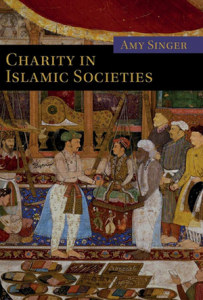Charity in Islamic Societies

Author: Amy Singer
Publisher: Cambridge University Press
Year of Publication: 2008
Print Length: 260 pages
Genre: Islamic Studies / History, Non-Fiction / Social Science, History
Topic: Muslim, Muslim World, Islam, Alms, Zakat, Waqf, Charity, Giving, Religion, Ethics & Morality, Humanitarian Action & Humanitarianism, Philanthropy, Organization, Religious Institution, Cultural Heritage/Legacy, Culture & Society, Politics & Power, Social Impact, Social Movement, Social Work & Services, Social/Aid Workers, Volunteer & Volunteerism
Muslim beliefs have inspired charitable giving for over fourteen centuries, yet Islamic history has rarely been examined from this perspective. In Charity in Islamic Societies, Amy Singer explains the basic concepts and institutions of Muslim charity, including the obligation to give on an annual basis. Charitable endowments shaped Muslim societies and cultures in every era. This book demonstrates how historical circumstances, social status, gender, age and other factors interacted with religious ideals to create a rich variety of charitable practices, from the beginnings of Islam to the present day. Using written texts, buildings, images and objects to anchor the discussions in each chapter, the author explores the motivations for charity, its impact on the rich and the poor, and the politicisation of charity. This lucidly written book will capture the attention of anyone who is interested in the nature of Islamic society and the role of philanthropy throughout history.
Table of Contents
List of illustrations
Acknowledgments
Note on spellings and foreign words
Abbreviations
Introduction
1. Pray and pay alms
2. Even half a date
3. The upper hand
4. The poor and the needy
5. A mixed economy of charity
Conclusion: re-orienting charity
Select bibliography
Index

Amy Singer holds the Hassenfeld Chair in Islamic Studies and is Professor in the Department of History at Brandeis University, and professor emerita in the Department of Middle Eastern and African History at Tel Aviv University. She received her PhD in Near Eastern Studies from Princeton University. Her research began with an in-depth study of the relations between Ottoman officials and Palestinian peasants, in an effort to move Ottoman agrarian history beyond cataloging the demography and agricultural production of villages (Palestinian peasants and Ottoman officials, 1994). This first study revealed the importance of the Haseki Sultan waqf, a large, endowed public kitchen (imaret) founded in mid-sixteenth-century Jerusalem by the wife of Sultan Suleyman (Constructing Ottoman Beneficence, 2002). One endowment led to others, and to broader questions about of benevolent giving (Charity in Islamic Societies, 2008). She is part of OpenOttoman, an initiative to consider how digital tools and capacities can enhance and sustain Ottoman studies.
Source: https://scholarworks.brandeis.edu/esploro/profile/amy_singer/overview
More from Amy Singer in this library, click here.
